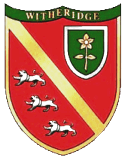

|
Memories of Mr W Pyne At the time Drayford Bridge was built Bill Pyne lived in the "Poorhouse" in West Worlington, and went to school in East Worlington. He recalled the opening, as all the schoolchildren were given an orange in celebration. There was some opposition to the destruction of the old narrow packhorse bridge led by the Vicar, who believed the old one should have been left and the new one built alongside. The Vicar reused to attend the opening, and it was believed that for some time afterwards he would shut his eyes when he rode past. Bill Pyne remembered this rhyme: Down to Drayford amongst the treesBarley bread and vinnied cheese Rashers of bacon tough as a thong That's how Drayford people lived along. He could offer no explanation of the old local joke about "Drayford Docks", though he had heard people talk about "the Drayford playboat going up to Creacombe". He started work with Notts at Coombe Quarry in 1921. He believed Notts began there in 1919, and that the reason for the installation of the aerial ropeway from the quarry to the depot on the A377 west of Newbridge was a disagreement between Archie Nott and the County Surveyor over the damage to the roads by Notts heavy lorries. The ropeway was run by a big Tangye engine installed by Frank Lawrence, and an old man called George Ash lived in a caravan by the quarry gate and lit up each working morning to raise steam. The wire ropes were continuous and the buckets were clipped to them. These buckets had small wheels for running on rails at the quarry end where they were filled up without stopping, and the shute-operator had to be very quick. Not only stone for the tar plant went up, but also most of the road stone in the various grades. Up to forty men were employed in the quarry at any one time. Stone went to the making of Winkleigh and Chivenor airfields in the 1939/45 war. Some building stone was produced, and it was said that Messrs Dart and Francis took stone from Coombe Quarry to carry out some of the repair work to Exeter Cathedral after the wartime bomb damage. In the 1920s the foreman was a 6ft 3in man called Bill Welch with a stiff leg and a thirst - he was reputed to drink a bottle of scotch in the Angel between the hours of one and two pm. Bill Welch didn't like Archie Nott's methods of payment - if a man's pile of cash was a penny short, he'd take a penny off the pile due to the next man. Bill persuaded him to engage a clerk. This was to be Bill Vernon, who at that time lived in South Molton and rode a motorbike, earning the nickname "leatherneck". His office was in Black Dog in Witheridge Square. When "Kissing Kate" - also referred to as "Old Partridge" came down to the quarry to preach to the men, Bill Welch refused to allow her to preach during the hours of work. She was said to have got her nickname from her habit of kissing every woman she met and shaking hands with the men. Hours of work were 7am to 5pm, except that on Saturdays work stopped at 4pm, until as a result of Union pressure elsewhere this was changed to 1pm on Saturdays. There was a rate of nine pence half penny an hour, and if rain stopped work, the men not only did not get paid, but were not allowed to go home either. In bad weather a weekly wage might only come to ten or eleven shillings. The stock in the explosives magazine was checked monthly by the police. Stone goggles were issued, but nothing was done about the dust. In the 1920s at the quarry it was all hand drilling; one man turned the drill and two men did the striking, but later on, Homlan's of Cambourne brought up a steam drill driven by a traction engine. This proved successful until the coming of the compressed-air drill with its compressor. Bill Baker, the blacksmith, used to sharpen the drills. At the quarry face two men worked together at loading a skip; the rate was eight tons an hour. The skip was then pushed on rails down to the crusher. A day's work was hard, and it you came to work at one minute past seven then no work counted for wages until seven thirty. Once or twice men tried to organise to obtain better conditions, but it was unless, as Archie Nott would not give way and, had the men struck, there were plenty of the unemployed who would have been willing to be taken on in their place. Previous Last Edited 03/07/2006 Copyright © 2000-2006 Witheridge Unless otherwise indicated on the page in question, the photographic images reproduced on this site belong to the Witheridge Archives, and, as such may not be reproduced for commercial purposes without written permission. However, you are welcome to use any of the photographs belonging to the archive for personal and/or non-commercial use. Any material shown as not being owned by the archive may not be reproduced in any form without first receiving written permission from the owner of the material in question. |

